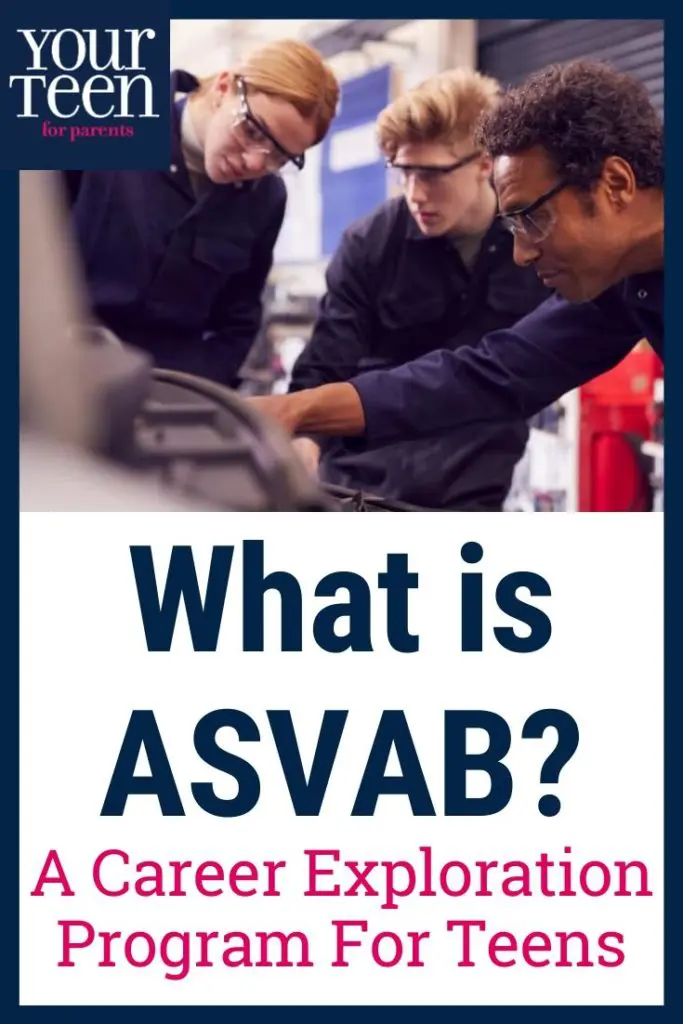Almost overnight the world changed and high school students were faced with a world of uncertainty. Class instruction moved online. SAT and ACT tests were suspended. College campuses were closed to visitors.

While it might feel as though your student is in a holding pattern regarding many aspects of their future, there are still some career exploration steps you can take now. College, career, military – all have something to offer and it’s hard to know what might be right for your student.
While there are numerous resources that can help, one that many parents and teens may not know about is the ASVAB Career Exploration Program, which combines an aptitude test with a career inventory to connect skills and interests to help point your student to a path that’s right for them.
Why Should Students Participate in the ASVAB Career Exploration Program?
What does the ASVAB test? Unlike standardized tests that primarily measure math and language, the ASVAB CEP includes sections that assess electronics, science and mechanical aptitudes, which can help open doors students might not otherwise have been considering, says ASVAB Career Exploration Program Director Shannon Salyer.
[adrotate banner=”163″]
Taking the ASVAB can be helpful even before choosing your post-high school path, says Jason Downey, a guidance counselor at Beachwood High School in Beachwood, Ohio, who recommends it to all his students in 10th through 12th grade. Those who take it earlier find the results summary can help guide them to his district’s career training program that covers welding, auto mechanics and other in-demand trades. “The report shows a breakdown in which areas are strong and the careers that go along with those scores so they can start exploring interests early,” Downey says.“The program is exploratory, rather than prescriptive—more of an aptitude test and interest inventory,” she says. The more your teen can explore their skills and interests the better, considering that 61% of degree holders say they would choose a different undergraduate major if they could, according to a recent BestColleges survey.
How to Access the Resources Now
While the program is usually offered through high school guidance counselors, due to COVID-19, ASVAB CEP testing activities are temporarily suspended. However, there are things parents can do now and over the summer with their teens to help start the conversation about what’s next after high school.
To use the career exploration components that are offered, create an account at asvabprogram.com by entering your email and using access code PSPR20. These tools include an interest inventory and a career catalog with occupational data and planning activities that help you put it all together. Additional online resources, including comprehensive information on colleges, scholarships, credentialing and the military, are all housed all in one place. That simplifies the comparison process, since families don’t have to locate the information individually from a variety of sources.
This account will give you access to the same tools that a student will receive once they take the assessment to get a head start on your research. In addition, you can check out March2Success, an online study program that helps students prepare to take standardized assessments including the SAT, ACT and ASVAB.
ASVAB CEP Scores Can Open Doors to Free College
While participating in the ASVAB Career Exploration Program doesn’t mean kids are automatically approached by the military, excelling on the test can open doors they might not even have known existed.
“For those higher-scoring students, it might put them on the path to the “Reserve Officer Training Corps” (ROTC) or the military academies, where students can then see themselves earning free college tuition and then serving as an officer,” says Downey. “Many are really excited to learn about these options where they can get a well-rounded college experience and come out debt-free.” ROTC, for example, is offered on many college campuses as a paid college education, and a guaranteed post-college career.
Parents can opt in or out of having their scores sent to the military if they’d like their child to explore that path. “Having someone explain the compelling benefits of a military career can be very powerful,” Salyer says.
And if parents know their child is already considering a military career, this puts the power in their hands. That’s because outside of the school setting, young people who are considering enlisting in the military have to be sponsored by one branch of service to take the ASVAB.
Qualifying scores will put students on all the branches’ radar, allowing students to compare offers and see what sign-on bonuses are being offered from each one.
Choose Your Own Adventure
Once a student takes the test, the scores are good for two years. So if “Plan A” doesn’t work out, they can revisit it. “A lot of kids appreciate that these resources are still available if they decide to go back and rethink their decision,” Salyer points out.
Other times she sees students taking the ASVAB twice—once in their sophomore year, in order to use the aptitude results as a guide to class selection, and again in their senior year once they’ve become exposed to more concepts and solidified their interests.
It’s also important to remember that teens are liable to change course. “We like to think of this progression as a ‘Choose your own adventure’ where there’s not just one pathway. People tend to think military or college or credentialing. But in reality it can be ‘and’. We see students pursuing all those pathways at once or different ones at different times in their lives.”
Someday, hopefully soon, our kids will all be back in school and ready to focus on the future.

But until then, these resources are a great place to start. And when your student’s school offers the ASVAB, encourage them to sign up to participate. Then follow up with your counselor to make sure not to miss the valuable Post-Test Interpretation. Not sure if your school offers the ASVAB CEP? You can express your interest by visiting this site to request information for your counselor.
After all, who knows what doors it may open?





